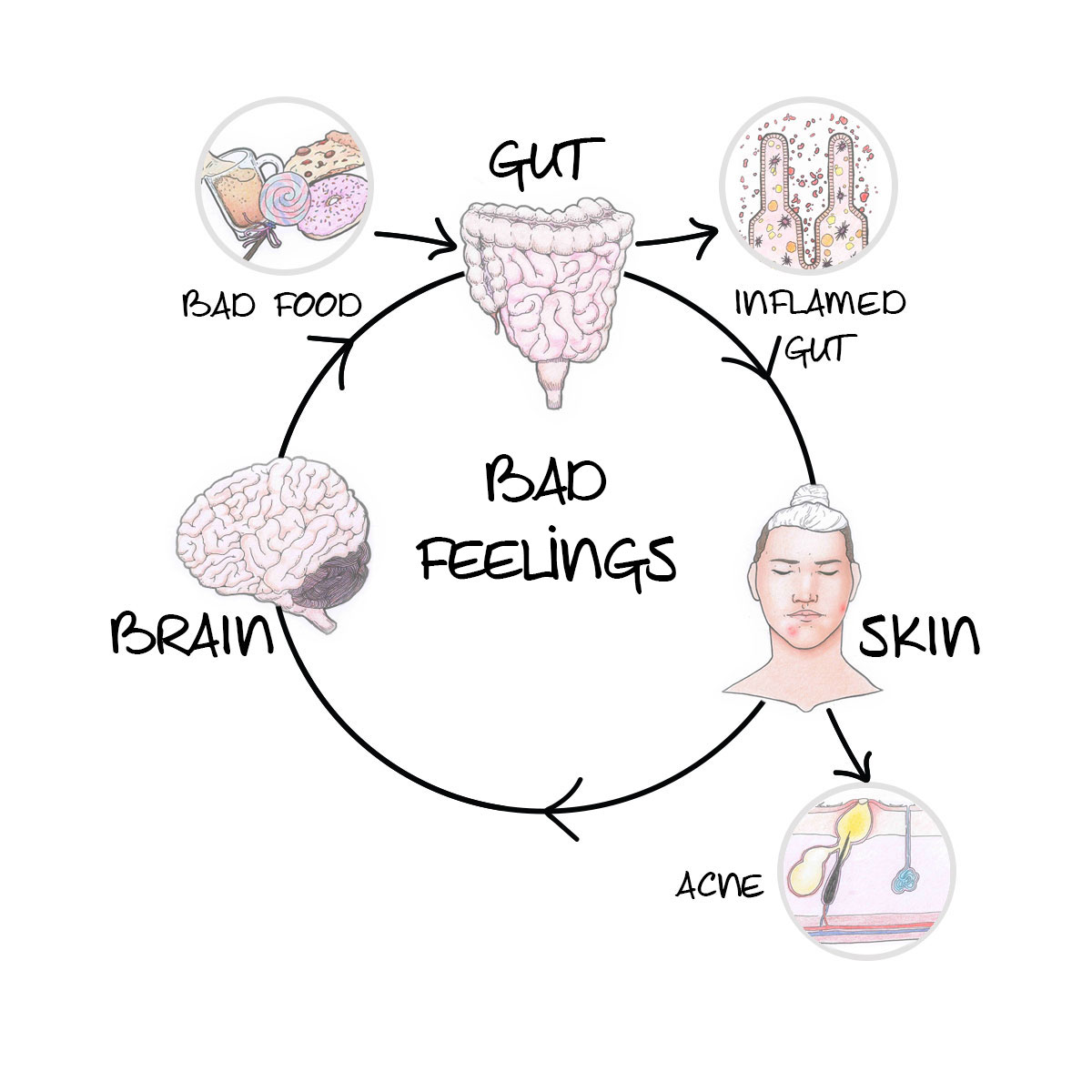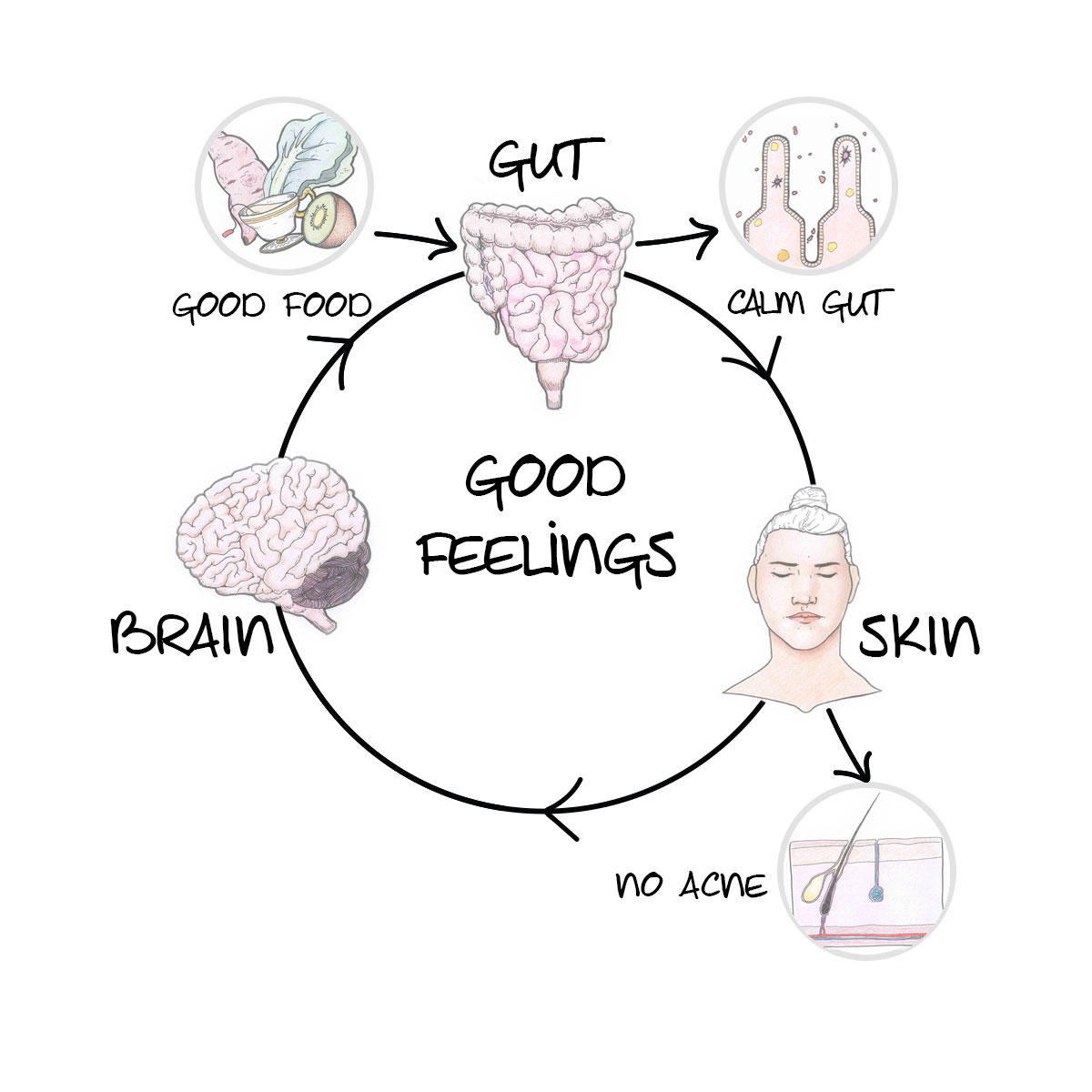The New Science On Acne
The Skin-Gut-Brain-Diet Connection
In my 20 years as a holistic skincare therapist, I have come to trust that the nutrition and wellbeing practices we use to bring about skin transformations will eventually be validated by science. This is proving to be true now more than at any other time in my career as our industry enters the wellness era.
Acne is the focus of new scientific research which is overturning old myths and affirming that a holistic approach is necessary for effective treatment.
It used to be widely accepted that acne was the result of a genetic tendency for skin sebum to get trapped in the pilosebaceous canal. However, new research points to multiple triggers for acne including the food we eat, our gut health and even our anxiety levels.
This scientific research is confirming what I have found to be true through two decades of transforming acne through botanical skincare, skin nutrition and well-being wisdom.
Acne is a particularly distressing skin disorder, and I hope this valuable research which explains the connection between skin, diet, gut and brain chemistry will help us all to understand this complex disorder better and treat it more effectively.
THE DIET + ACNE CONNECTION
For many years, acne sufferers were told that the food they ate had no impact on their skin. Sadly, this was not the case! Studies now show that while diet is not the cause of acne, it can fuel it. Acne treatment is usually ineffective until the foods that are feeding the acne are removed.
The research highlights two dietary sources which fuel acne – sugar and saturated fat. A high intake of these food sources changes the composition of the sebum the skin produces, which in turn promotes the colonisation of P acnes. These little-known microbes are a slow growing bacterium that are linked to acne. They are a normal part of the skin microbiome, but in healthy skin, the number of P acnes are so low they are barely detectable.
On the other hand, a diet high in sugar and nasty fats can cause a population surge of these bacteria, resulting in cell damage, protein secretions and bacterial debris that can lead to red, angry, inflamed acne.
Diet Strategies for Treating Acne
- Remove processed sugar and saturated fats from diet while treating acne. Common acne-fuelling foods to avoid are: chocolate, cheese, full-cream dairy products, meat-fat, fried foods, chips, protein powders, cashews and peanuts.
- Nourish skin with a whole-food diet and make some skin-friendly treats to have on hand for when cravings strike.
- Take a good quality Essential Fatty Acid (EFA) supplement. EFA’s are essential for acne-prone skin as they improve the free-flow quality of the skin sebum, avoiding the formation of blockages and even clearing existing ones.
- Prescribe skin nutrition boosters to provide foundational nutrients for healthy skin.
 THE GUT + ACNE CONNECTION
THE GUT + ACNE CONNECTION
Unhealthy bacteria colonies in the gut and a compromised gut wall can lead to skin inflammation and the development of skin disorders. Studies have shown that 66% of acne sufferers have intestinal permeability (leaky gut) issues and an even higher percentage suffer from constipation. A congested bowel is often reflected in congested skin!
40% of acne sufferers also have low stomach acid and this results in increased populations of harmful microbiota in the gut. These unwanted microbes produce substances that can get into the blood stream. When this happens we rely on the liver to filter them out, but if the liver is overloaded then these toxins will negatively impact the skin.
The skin is the visible sign of what is happening in the whole body. When the gut/digestive system is blocked up and overloaded with harmful microbes, it is often reflected in the blocked pores and bacteria-laden skin inflammation we call acne.
Gut Strategies for Treating Acne
- Reduce sugar and processed foods which feed bad bacterial populations in the gut
- Eat fermented foods such as kombucha, sauerkraut and kefir which feed healthy bacteria populations.
- Prescribe a fibre-rich, probiotic powder to stimulate elimination, repair the gut wall and increase populations of healthy bacteria in the gut.
- Take one tablespoon of apple cider vinegar in ½ cup of water before meal to compensate for low stomach acid and improve digestion.
 THE BRAIN + ACNE CONNECTION
THE BRAIN + ACNE CONNECTION
Did you know that it has been shown that acne sufferers are more likely to suffer from depression or anxiety than people with other chronic medical conditions? There is a two-way conversation between the gut and the brain which has significant implications for the way we treat both acne and anxiety.
Stressful emotions slow down the movement of the gut and increases the time it takes for food to pass through the digestive system. This can negatively impact the gut microbiota which in turn, has a negative impact on the skin as described above.
Conversely, the gut can affect our brain. Our gut bacteria produce neurotransmitters (dopamine, serotonin, substance P and GABA) which have a direct impact on our brain chemistry and mood. A vicious downward cycle can be set in motion with anxiety and depression negatively affecting the gut, resulting in bacteria that in turn contributes to low mood. One thing fuels the other and both fuel the acne.
Brain Strategies for Treating Acne
- Improve stress resilience with mindfulness and meditation.
- Every day take 20 deep, slow breaths which will help to condition the body towards the parasympathetic nervous system which is the ‘rest and repair’ mode.
- Feed a happy brain with a nourishing ‘happy gut’ diet.
- Build self-care and soul-care rituals into each day to support wellbeing.
- Develop a daily gratitude practice to direct the conscious and sub-conscious mind towards the positive things in your life.
THE SKIN-GUT-BRAIN CONVERSATION
It’s clear to see that acne is more than a simple skin problem. There is a complex gut-skin-brain conversation that is going on within the body via the metabolites, the neuroendocrine system and central nervous system.
To truly support our clients in their journey to heal their acne, we need to encourage a healthy diet with alternatives to foods that fuel acne, to help them to improve their gut health and to offer them wellness wisdom tools that will support their mental wellbeing and improve their stress resilience. It is a completely holistic approach.
I find it so interesting that 25 years ago my mentor, Janice Smith, said to me, ”Janine, take a good look at your skin disorder clients, they have sensitive skin, a sensitive gut and a sensitive personality. It all goes hand in hand”. It looks like science has proven her holistic instincts and observations right once again!
- July 29, 2018
- 1

